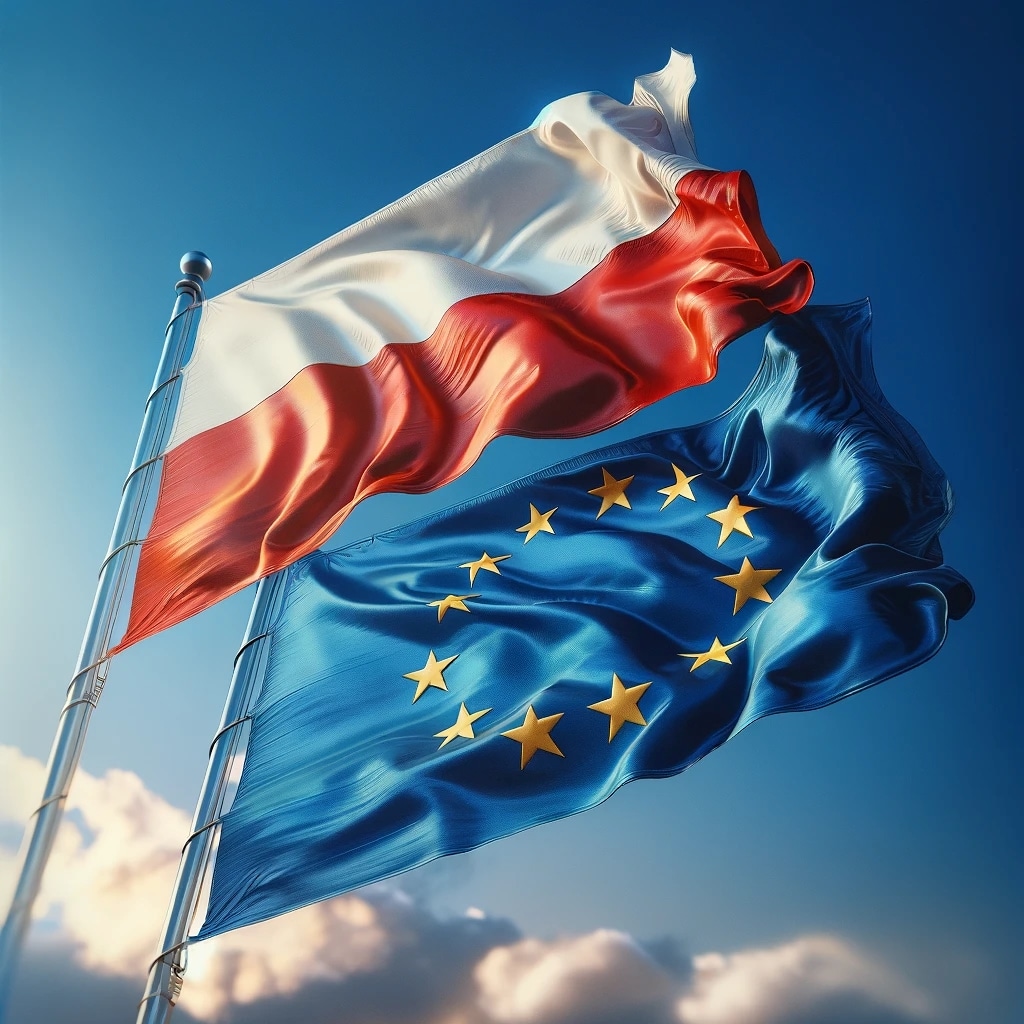20 years in a changing EU
When Poland became a member state of the European Union on May 1, 2004, Warsaw was perhaps still a somewhat distant destination for many in Brussels. But 20 years down the line and Poland’s capital has come to represent a new center on the map of the EU. Poland’s economic dynamism and more recently its central role in combating Russian aggression in Ukraine – notwithstanding a series of spats with Brussels between 2015 and 2023 – mean that Warsaw is an indispensable European nation again.
Economic boost
If it were not part of the single market, Poland’s GDP per capita would be 31% lower, at 60% of the EU average, according to a Polish Economic Institute (PEI) report. In 2018, almost a quarter of the country’s GDP was indirectly or directly dependent on the EU.
“If it were not part of the single market, Poland’s GDP per capita in 2021 would be at its 2014 level; EU membership has therefore boosted it by nearly 1.5 pp per year. This is a very tangible indicator that translates into wages, company incomes, state budget revenues and, consequently, a higher standard of living for Poles within the EU. Between 2004 and 2018 alone, the share of Polish GDP generated by demand in other EU countries increased from 15.6% to 21.2%,” says Marek Wąsiński, head of the world economy team at the PEI.
Poland was the largest beneficiary of EU funds in 2014-2020, with one in four euros going to the country. More than 97,000 investments with a total value of more than 553 billion zlotys are currently being carried out with EU funding. Polish exports of goods to the EU, which account for 75% of the country’s total exports, reached €216 billion in 2021. “Close trade cooperation with the EU has enabled Poland’s economic success and that of Central Europe as a whole. Two-thirds of the country’s economic growth can be attributed to exports. In 2018, over 3.3 million jobs in the country resulted from demand for goods and services containing added value in Poland. Currently, every fifth job in Poland depends on demand created in EU countries,” says Jan Strzelecki, a member of the world economy team at the PEI.
The EU recently approved over €5 billion in grants and loans for Poland from the bloc’s post-pandemic recovery fund. It is the first payment to Poland from the Recovery and Resilience Facility (RFF), with Brussels until now withholding funds over rule-of-law concerns. Known as RePowerEU, the fund was introduced in the wake of the invasion of Ukraine and is designed to help member states end reliance on Russian fossil fuels.Poland applied for RePowerEU funds last year and, in November, its then minister for funds and regional policy, Grzegorz Puda, confirmed that the European Commission was set to approve the application.
Brussels-Warsaw spats resolved
When Prime Minister Donald Tusk took power in December, he vowed to restore rule of law and improve Poland’s relationship with the EU and Justice Minister Adam Bodnar – who is tasked with clearing up after the previous government – unveiled an action plan in Brussels in late February alongside European Values and Transparency Commissioner Věra Jourová and Justice Commissioner Didier Reynders. “I am determined to restore constitutional order in Poland and solve the rule-of-law crisis,” Bodnar said. “Poland will be one of the leading members of the EU again.”
Bodnar said that it would take time for the EU’s sanctions procedures to be closed. “The destruction of the rule of law in Poland which caused legal uncertainty, chaos and politicization of the judiciary lasted eight years,” Bodnar told Politico. “Fixing that is not something that could be done in one day … But we don’t and won’t waste any time.”
There is much to undo. On 13 January 2016 the European Commission launched a formal rule-of-law assessment based on rules set out in 2014 and according to Article 7 of the Treaty of Lisbon regarding amendments of the constitutional court and the public media law in Poland. In September 2017 Commission launched the second stage of infringement over the state of rule of law in Poland after a quarrel between Warsaw and the EU that included logging of the Białowieża Forest, the refusal to accept refugees under the relocation program. On 14 July 2021, the Polish Constitutional Tribunal rules that any interim measures from the top European court against Poland’s judicial reforms were “not in line” with the Polish constitution. On 7 October 2021, the Polish Constitutional Court ruled that parts of the Treaty on European Union were incompatible with its constitution, therefore opening a new conflict with the European Union. On 27 October 2021, the European Court of Justice (ECJ) fined Poland €1 million per day, for breaking the law by maintaining the disciplinary chamber of its Supreme Court, as a previous EU ruling called for the disciplinary chamber’s suspension. The ECJ ruled that the chamber “[did] not guarantee judicial impartiality.”
Unblocking funds
In March, the Commission adopted two legal acts that pave the way for Poland to access up to €137 billion in EU funding. They relate to the rule of law reforms that Poland has adopted and the more recent steps that it has taken to address the milestones to strengthen judicial independence. The Commission concluded that Poland had satisfactorily fulfilled the two “super milestones” to strengthen important aspects of the independence of the judiciary through reforming the disciplinary regime for judges and committing to use Arachne, an IT tool that supports Member States’ auditing and control systems. Once confirmed by Member States, today’s Commission assessment would allow for the disbursement of €6.3 billion (net of pre-financing) of a total of up to €59.8 billion in RRF funds to Poland. Poland also meets the conditions related to the EU Charter of Fundamental Rights, allowing it to access up to €76.5 billion for its 2021 – 2027 Cohesion Policy, European Maritime, Fisheries and Aquaculture, and Home Affairs funding programmes.
Poland support enlargement
Poland supports Ukraine, Montenegro, Serbia and Turkey’s aspirations to join the EU and has welcomed the decision to grant Albania EU candidate status. This would prove that the EU’s internal transformation has been completed, and that this would additionally help to bring greater stability to the entire region. Poland participates in an informal group (called the “Tallinn Group”) that supports the expansion of the EU.
Euro defense
Poland’s skepticism about an EU common foreign and security policy and giving further powers to the EU’s foreign and security policy has diminished since February 2022. Poland has preferred to maintain relations with NATO and the United States, but with US prevarication over aid to Ukraine and the prospect of a Trump administration have turned Polish eyes towards an European defense structure. The new Polish government would in fact welcome German soldiers stationed in Poland, foreign minister Radoslaw Sikorski said in February. “German officers are already working here (in Poland) in several NATO outposts, in my hometown of Bydgoszcz, and also in Szczecin (near the German border). After Russian missiles fell near the border, we temporarily deployed German Patriot batteries to secure the eastern border” with besieged Ukraine, Radoslaw Sikorski told Swiss daily Neue Zuercher Zeitung.
On the discussion sparked by the previous – nationalist Law and Justice (PiS) – government about the advisability of deploying a German anti-missile defense system in Poland, Sikorski said: “At that time, Poland had a nationalist government. We are done with demonizing democratic Germany. This is a controversial topic for nationalists, but not for us. Germany is our ally, we are happy with allied cooperation to secure NATO territory. So German soldiers would be welcome here,” he said. Russian missiles with nuclear warheads deployed in Russia’s Baltic Sea exclave of Kaliningrad – which borders Poland – pose an equal threat to both Poland and Germany, he added.
“Slowly” – the minister responded when asked whether he would agree to storing European nuclear weapons on Polish territory. “I am a great supporter of common European defense, but we are not that far yet. The European defense budget is only now being created. And Germany is reluctant to expand it,” he explained.
Poles love the EU
A Eurobarometer poll in late December highlighted strong support among Poles for their country’s membership in the European Union, with 75% believing it is important. EU-wide elections are scheduled for June 9 and a recent Eurobarometer poll suggested a growing interest in EU affairs among Poles – compared to five years ago, interest in the elections has increased by 16 percentage points, to 68% keen to vote. Across the EU, 45% of respondents have a positive view of the bloc, 38% are neutral, and 16% view it negatively. In Poland, it is53%, 37%, and 10%, respectively.







